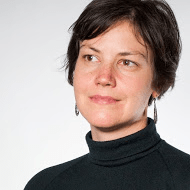Judy R. Twedtweaves together climate science and digital sound arts to create data-driven soundtracks that bring greater expression and immediacy to climate communication. A native of Tacoma and fifth-generation Washingtonian, she has a master’s degree in Atmospheric Sciences where she used state of the art global climate models to understand Antarctic sea ice variability. Her pieces blend data sonifications with natural sound recordings to promote greater awareness of our rapidly changing planet. Her research combines work in Atmospheric Sciences and the program on Digital and Experimental Arts to create new sonic forms of climate communication, and to study its impacts on listeners. No stranger to interdisciplinary work, her Bachelors degree from Colorado College was in History and Philosophy, with an emphasis on environmental ethics. Note, Judy is a recent winner of a Husky Green Award and a Husky 100!
What attracted you to the IPhD program?
I wanted to take my research in a new direction that didn’t fit neatly into any existing program. After completing my masters degree in Atmospheric Sciences, I spent a summer doing quite a lot of science outreach and reading literature in the social sciences about the need for more emotional engagement in discussions of climate change. I had already been experimenting with sonification of climate data, and realized that the IPhD program offered an opportunity to turn what had been a side project into the main thrust of my research.
What is your research focus?
I use digital sound arts to communicate climate science, so my work lies within Atmospheric Sciences and Digital/Experimental Arts. The process is called data sonification — I take canonical climate data sets and map them to pitch, then add layers of other sounds — either beats or recordings from the natural environment — to create a resonant experience. Sonification is analogous to visualization, and allows me to work with the temporal dimension in ways that aren’t possible with static visualizations. It also allows for more affective communication; a data set can be sonified with, for example, a sense of urgency, humor, or alarm.
How does pursuing the IPhD degree benefit your long-term research goals?
My long-term goals are to promote greater public understanding of the Earth System and awareness that we are irrevocably altering our finite planet. I am passionate about climate education, and fostering deeper connections between the arts and climate science.
What was/were your favorite course(s) as a master’s student?
A course on global climate modeling. It’s amazing that we are able to link together complex mathematical models of the atmosphere, ocean, sea ice, biogeochemistry and ice sheets to simulate and study the earth system. Working with models and running experiments with them helped me develop a habit of mind of thinking about the earth system on large temporal and spatial scales.
What advice would you give to other people thinking about the IPhD program?
I’d suggest to first see if there’s any way you can carry out your research in an existing program (it’s easier!). If not, then talk with faculty in the departments you want to work with; you’ll need a committee that is interested in and willing to mentor you. If you have that in place, and a feasible project in mind, then you’re ready to move forward.
What is something you are exceptional at that might surprise people to learn about you?
I am very skilled at field logistics and working with people under pressure. The summer before starting graduate school I went on a research expedition on a Canadian Icebreaker to study sea ice in the Beaufort Sea. The scientist that I was working for was unable to come at the last minute, so I was tasked with assembling and deploying instruments that I had never seen or used before, and organizing a team of people to help with sea ice measurements. Despite my lack of experience, I successfully deployed all of the instruments and we returned with four sea ice cores!
